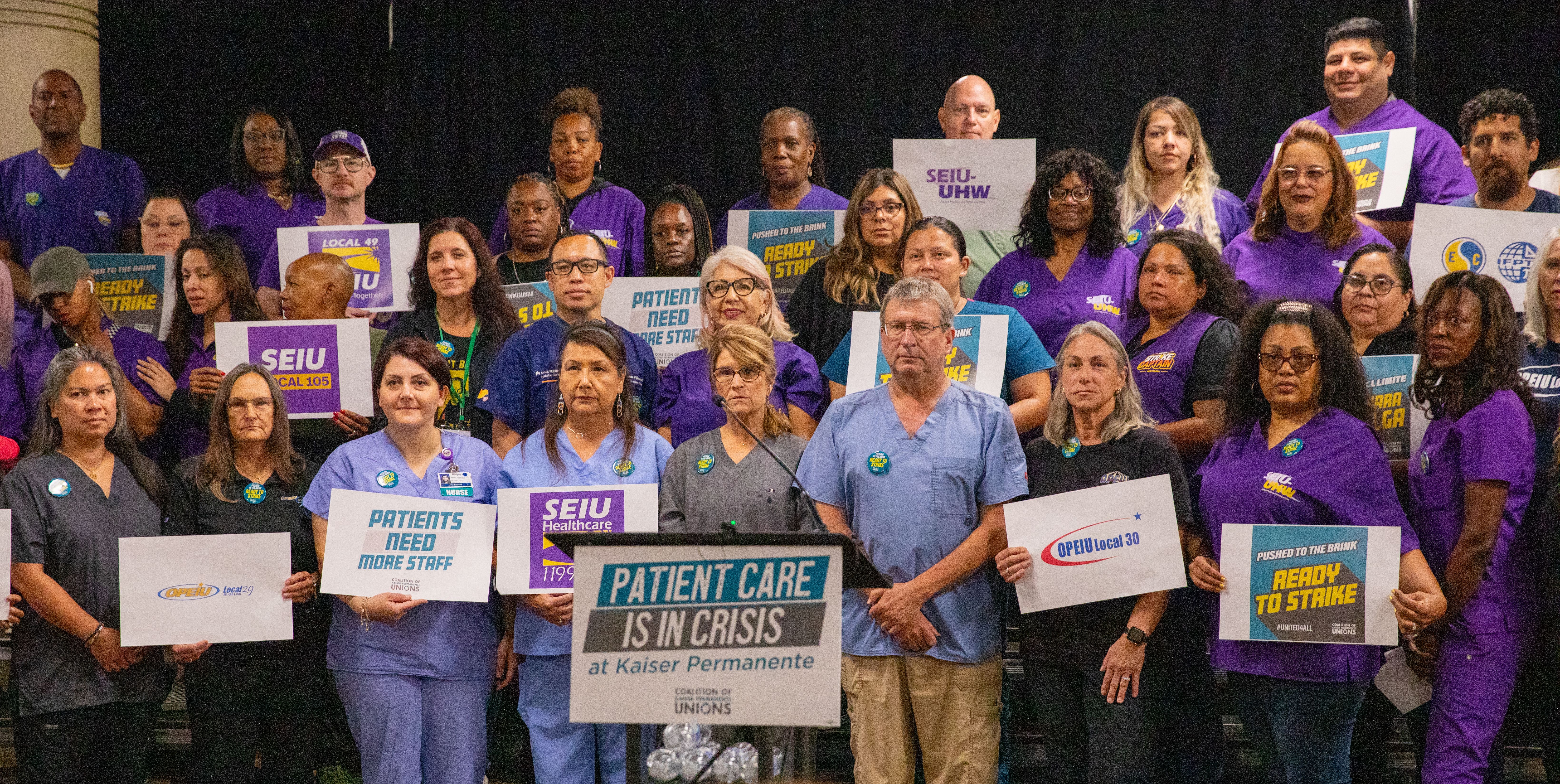More than 75,000 Kaiser Permanente workers plan to begin strike Wednesday
Union workers have planned a three-day walkout. Labor groups say it would be the nation’s largest strike of healthcare workers.
Barring a late-breaking deal, more than 75,000 Kaiser Permanente union workers plan to launch a three-day strike Wednesday.
Tens of thousands of Kaiser Permanente union workers are slated to go on strike starting Wednesday, Oct. 4, unless there's a late deal. (Image credit: SEIU-HUW)

The California-based healthcare systems and unions have been engaged in talks for weeks without coming to an agreement. The union workers’ contract expired Saturday, Sept. 30.
The Coalition of Kaiser Permanente Unions said workers would walk out at 6 a.m. Oct. 4. Unless the two sides broker a deal, the union members won’t return to work until 6 a.m. Oct. 7.
The unions say it would be the largest healthcare workers’ strike in U.S. history.
In recent weeks, Kaiser Permanente workers have cast ballots in strike authorization votes in California, Colorado, Oregon, Washington, Virginia, and Washington, D.C.
In a statement Saturday, the Coalition said there were some “good discussions” with Kaiser on some issues, including remote work, shift differentials, and investments in training healthcare workers.
But the Coalition said Saturday the two sides remain “far apart” on key issues including compensation. The SEIU-United Healthcare Workers West, which represents the bulk of the workers, has also said Kaiser Permanente needs to make a commitment to improve staffing levels for nurses.
Kaiser Permanente operates 39 hospitals and more than 600 other medical offices and its health plan serves nearly 13 million members. The system says it has offered raises and improvements to benefits packages.
The Coalition has said it’s been seeking raises of 6.5% in each of the first two years of a new pact, and raises of 5.75% in each of the final two years of the four-year deal.
On Sunday, Kaiser Permanente said it had adjusted its proposals and is offering a four-year deal with 4% raises in each year for those in northern California and Washington. For those in other markets, the system is offering a 3.5% raise in the first year and 3% raises in each of the final three years of the deal.
Kaiser Permanente says it’s also offering higher minimum wages, ranging from $21 to $23 in 2024 and rising to $23-$25 in 2026, depending on the market.
While Kaiser Permanente also said there has been some progress in the talks, the system is preparing for employees to begin their strike Wednesday.
“While these plans to strike are disappointing, we remain committed to reaching an agreement that is good for our employees, our members, and our organization, and we will continue to bargain in good faith with the Coalition,” Kaiser Permanente said.
Dave Regan, president of SEIU-United Healthcare Workers West, has focused on staffing concerns as a key issue that must be resolved. SEIU-UHW represents more than 60,000 workers.
“Kaiser executives refuse to acknowledge how much patient care has deteriorated or how much the frontline healthcare workforce and patients are suffering because of the Kaiser short-staffing crisis,” Regan said in a Sept. 22 statement.
The Coalition says it’s seeking the right to form a union at any other health systems that Kaiser Permanente acquires in the future. Kaiser Permanente announced its plans to acquire Geisginer, the Pennsylvania-based system, earlier this year.
Kaiser Permanente and the unions have also been negotiating over provisions regarding outsourcing of certain functions. The Coalition said there has been progress on this front but is seeking protection for the revenue cycle workforce.
Hospitals have experienced some high-profile labor battles over the past year.
In January, thousands of nurses in New York went on strike before reaching an agreement on a contract. About 15,000 Minnesota nurses took part in a three-day strike in September 2022, and they threatened a second walkout in December, but labor and management managed to broker a deal.
Telehealth faces a looming deadline in Washington | Healthy Bottom Line podcast
February 12th 2025Once again, the clock is ticking on waivers for telemedicine and hospital-at-home programs. Kyle Zebley of the American Telemedicine Association talks about the push on Congress and the White House.















